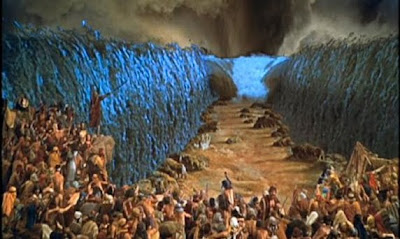It is an interesting theory, and sounds reasonable with no other information involved; however, if we take that at face value, then we must also say that the Israelites were never in Egypt, the story of Moses (which he wrote) is totally inaccurate, and that the Exodus never took place.
 This is because, despite Moses saying the Israelites were in Egypt for over 400 years, there is conspicuously no Egyptian records or legends speaking of the Israelites in Egypt that have ever been found despite the extensive research, digging and interpreting that has taken place there! Therefore, according to the reasoning of Mesoamerican theorists, the Israelites never went to Egypt, the story of Joseph and his coat of many colors is all fiction, and the twelve tribes of Israel must, in part, be a fairytale.
This is because, despite Moses saying the Israelites were in Egypt for over 400 years, there is conspicuously no Egyptian records or legends speaking of the Israelites in Egypt that have ever been found despite the extensive research, digging and interpreting that has taken place there! Therefore, according to the reasoning of Mesoamerican theorists, the Israelites never went to Egypt, the story of Joseph and his coat of many colors is all fiction, and the twelve tribes of Israel must, in part, be a fairytale. While some archaeologists leave open the possibility of a Semitic tribe coming from Egyptian servitude among the early hilltop settlers and that Moses or a Moses-like figure may have existed in Transjordan ca 1250-1200, they dismiss the possibility that the Exodus could have happened as described in the Bible
 In the past century of research by archaeologists and Egyptologists, there has been found no evidence which can be directly related to the Exodus narrative of an Egyptian captivity, no record of two million Hebrew slaves, no record of their escape and travels through the wilderness, no record of any Pharoah or his army being suddenly lost, no record of any plagues, and no Egyptian records that lends itself to any kind of support of this period involving Israelites or Moses’ category of events at all.
In the past century of research by archaeologists and Egyptologists, there has been found no evidence which can be directly related to the Exodus narrative of an Egyptian captivity, no record of two million Hebrew slaves, no record of their escape and travels through the wilderness, no record of any Pharoah or his army being suddenly lost, no record of any plagues, and no Egyptian records that lends itself to any kind of support of this period involving Israelites or Moses’ category of events at all.Evidently, using the Mesoamerican logic, we can never again tell the story of Moses in Egypt, the Exodus, or that of Joseph and his many trials and accomplishments as the Prime Minister of Egypt. Nor, even can we account for Joseph’s sons (Ephraim and Manasseh) born in Egypt, through which so many blessings are promised.
The question is, does this sound reasonable or logical? After all, Moses tells us in two different areas of writings that all these events did take place. But they cannot be verified by secular records.
The same is true of the Nephites. We know they existed and we know they had records and could write in at least two languages. Yet no secular record of their writing has ever been found in the one location in the Western Hemisphere that matches EVERY geographical description in the scriptural record.
So what do we do with such type of reasoning? Do we follow the scriptural record, or do we go after secular historical information?
Certainly, the Mesoamerican theorists follow secular history by constantly referring to the writings of Bernardino de Sahagún (16th century); Fernando de Alva Cortés Ixtlilxochitl (16th century); Juan de Torquemada (16th century); the “Popol Vuh” a text corpus of mythistorical narratives of the Post Classic Quiche kingdom in Guatemala’s western highlands (16th century, oldest copy 1701); the Chilam Balam, nine manuscripts named after small Yucatec towns such as Chumayel, Mani, and Tizimin, and mostly consist of disparate texts in which Mayan and Spanish traditions have coalesced (18th and 19th centuries); The Annals of the Cakchiquels, a Maya history, and the Annals of Xahila, history written in the Maya tongue (both 17th century).
While there is nothing wrong with including such manuscripts for support information, the Mesoaemrican theorist relies more on these secular histories than the scriptural record according to their various writings. Thus it is no wonder they reject the area of Educador, Peru and Chile, since there are no ancient histories that have survived the area and can be used to prove a model.
The point is, despite there being no written records surviving in the Andean area of ancient peoples, Mormon and Book of Mormon prophets have described time and again the nature of their enemy, the Lamanites, and how they would destroy every record they found. The fact that no such records were found prior to the coming of the Spanish seems a mute testimony of the accuracy of Mormon’s comment: “having been commanded of the Lord that I should not suffer the records which had been handed down by our fathers, which were sacred, to fall into the hands of the Lamanites, (for the Lamanites would destroy them)” (Mormon 6:6).




No comments:
Post a Comment